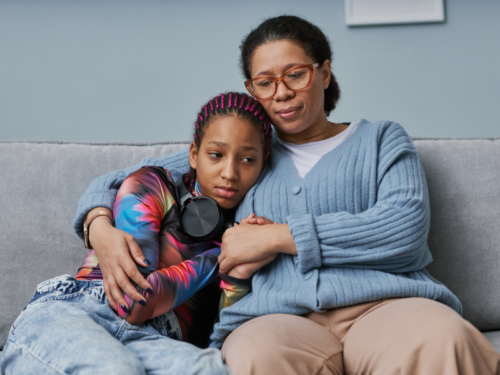
Table of Contents
Subtle Signs of Depression
Written By: Charlie Health Editorial Team

Clinically Reviewed By: Dr. Don Gasparini
October 6, 2023
5 min.
People usually imagine that being depressed means feeling down and not leaving bed, but there are actually some subtle signs of depression that are often overlooked. Keep reading to learn how to spot the more insidious signs of this mental health condition.
Learn more about our Clinical Review Process
Table of Contents
What are some subtle signs of depression that most people ignore?
Depression can sometimes be tricky to spot because it often shows up in subtle ways that many people overlook or attribute to something else. Below, we detail some of those less obvious depression symptoms to keep an eye out for. However, like any mental health condition, depression is not a one-size-fits-all diagnosis. Not everyone experiencing depression will show all of these signs, and the severity of symptoms can vary from person to person. In fact, someone may experience these symptoms without having depression at all.
That being said, if you or someone you know is showing several of the below signs consistently, it’s a good idea to seek support from a mental health professional. Depression is treatable, and early intervention can significantly affect a person’s well-being. Here are some subtle signs of depression that most people overlook:
Heightened irritability
People dealing with depression can become noticeably more irritable and easily frustrated, even over small issues. Sometimes, this irritability is mistakenly chalked up to having a bad day or a temporary mood shift when it could in fact be a symptom of depression.
Appetite fluctuations
Changes in eating habits can be an indicator of depression. Some people may lose their appetite and shed weight, while others might start eating more and gain weight. These fluctuations can reflect shifts in mood associated with depression.
Sleep troubles
Whether it’s struggling to fall asleep, waking up frequently during the night, or waking up too early in the morning, sleep disturbances are common among those with depression.
Loss of interest or enjoyment
One of the key markers of depression is losing interest in activities or hobbies that used to bring joy. Despite being a hallmark of depression, this symptom can be subtle because it tends to happen gradually.

Social isolation
Depression often leads to withdrawal from social interactions. People might decline invitations or stop reaching out to friends and family.
Difficulty concentrating
A lack of focus and difficulties with decision-making can also be signs of depression. People with depression may find it tough to concentrate on tasks at work or school.
Physical complaints
Unexplained physical symptoms like headaches or stomach aches can be linked to depression, especially when there’s no clear medical cause. Ongoing physical discomfort, like chronic back pain or joint pain, may also become more pronounced when someone is dealing with depression.
Fatigue and low energy
Feeling constantly tired or drained of energy can be another subtle sign of depression that’s often brushed off as normal tiredness.
Negative self-talk
Continuous negative thoughts about yourself, your abilities, or the future can be a clue that you might have depression. These thoughts are often internal and not easily noticeable to others.
Heightened sensitivity
Depression can make people more sensitive to criticism or rejection, which can actually deepen feelings of sadness associated with the condition.

Personalized treatment for depression from home
Intensive therapy for teens, young adults, and families
Why does depression relate to physical conditions?
Like many mental health conditions, depression doesn’t just affect emotions and thoughts; it can also take a toll on physical health. It’s crucial to recognize how depression and physical health are interconnected and take a holistic treatment approach. The mind-body connection between depression and physical health issues can be explained in a few different ways.
One main reason depression affects physical health is because the condition often involves imbalances in certain brain chemicals (neurotransmitters) like serotonin and norepinephrine. These chemicals not only affect your mood but also control things like sleep, appetite, and how you perceive pain. When these chemicals are out of balance, it can affect your physical health in various ways.
Depression is also associated with a range of physical symptoms. For example, studies show that depression is linked to chronic inflammation, which can lead to problems like heart disease and diabetes. Stress and depression can also impact sleep and appetite and weaken the immune system, which can impact overall well-being. Some people may also notice that antidepressants, medications commonly prescribed in the treatment of depression, have physical side effects.
How can you tell if a friend or family member is depressed?
Recognizing depression in a friend or family member can be challenging, as people may not always express their feelings openly. However, there are several signs and changes in behavior that may indicate someone is struggling with depression. Although not everyone with depression will display these signs, it’s important to take them seriously and offer your support if you observe them for an extended period of time. Here are some ways to tell if a friend or family member might be depressed.
- Persistent low mood with long periods of unexplained sadness or irritability
- Loss of interest in activities they used to enjoy, including hobbies
- Changes in sleep habits, including difficulty sleeping or excessive sleepiness
- Overeating or a loss of appetite (and in some instances, weight gain or weight loss)
- Fatigue or low energy levels, even after a full night’s sleep
- Isolating from friends and family, canceling plans, or avoiding social activities
- Struggling to focus and make decisions
- Neglecting responsibilities, including household chores or work tasks
- Unexplained physical symptoms, including headaches or muscle pain
- Talking negatively about themselves
- Inability to take care of their physical health, including personal hygiene
- Substance use (especially to cope with emotional pain)
- Increased irritability leading to conflicts over small things
- Expressing feelings of hopelessness, helplessness, or thoughts of self-harm or suicide
If you believe that someone with depression is in danger of harming themselves or struggling with suicidal thoughts, they should get professional mental health support immediately. You can contact The Suicide & Crisis Lifeline 24/7 by calling or texting 988. Some people may choose to call 911 or go to an emergency room for immediate care.

How to support someone with depression
If you think a loved one is struggling with depression, it’s important to approach the situation with empathy, non-judgment, and open communication. Express your concern, let them know you’re there to support them, and encourage them to seek professional help from a therapist or counselor. Be patient, as recovery from depression takes time, and your support can make a significant difference in their journey toward healing. As mentioned, if you believe they are in immediate danger or struggling with suicidal thoughts, don’t hesitate to contact a crisis hotline or seek emergency help.
Young adult and teen depression support at Charlie Health
If you or a loved one are struggling with depression, Charlie Health is here to help. Our virtual Intensive Outpatient Program (IOP) combines peer groups, individual therapy, and family therapy for teens and young adults who need more than once-weekly mental health treatment—including those struggling with depression. Our virtual IOP has been shown to reduce depression symptoms by 60%. Charlie Health’s compassionate mental health professionals are here to listen to your story, understand your needs, and match you with an appropriate treatment plan. Fill out our short form to get started today.




